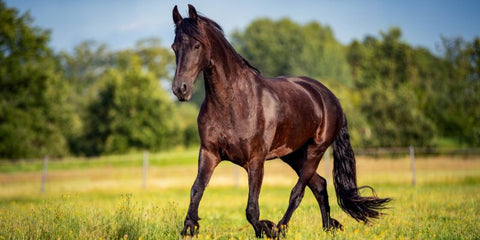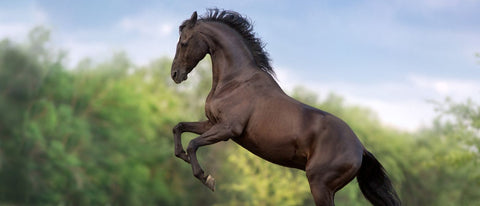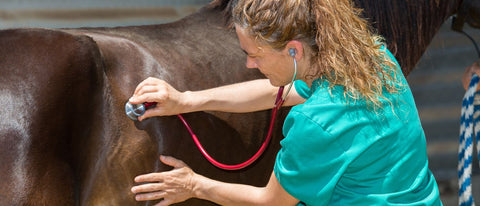
Florian ist aufgewachsen auf einem Bauernhof. Umgeben von Pferden, entdeckte er früh seine Faszination für diese majestätischen Tiere. Inspiriert von seiner reitbegeisterten Mutter, entwickelte er das Nahrungsergänzungmittel - Pferdegold. Seine tiefe Verbundenheit zur Natur und die leidenschaftliche Hingabe zu Pferden trieben ihn an, sein Unternehmen zu gründen.
How much does a horse weigh? A general answer to this question is impossible, as a horse's weight depends on various factors.
Since being overweight, just like being underweight, can lead to health problems, it's important to keep your weight under control. This article provides you with helpful facts about weight.

All information at a glance: How much does a foal weigh?
How much does a foal weigh after birth? It is estimated that the body weight of a newborn foal is about ten percent of its mother's body weight .
For example, if a healthy mare weighs 600 kilograms , her healthy foal will weigh approximately 60 kilograms .
The following facts count for the weight of a newborn foal :
-
The father's body weight is of secondary importance
-
The body weight of the mother mare primarily influences the weight of the foal
-
Young mares that are pregnant for the first time almost always give birth to smaller foals than usual
- Below-average weight occurs in foals with birth problems, premature foals, and foals from twin pregnancies
All information at a glance: How much does a horse weigh?
How much does a horse weigh? A horse's weight depends, among other things, on the animal's breed, size, and age.
A horse with a lot of muscle tissue that is trained intensively usually weighs less than an animal of the same breed that is kept on pasture and receives little exercise.
A horse disease such as intestinal inflammation also affects weight.
An adult horse, 1.60 to 1.70 centimeters tall, can weigh between 500 and 600 kilograms . Cold-blooded horses are heavy, sometimes weighing more than 800 kilograms.
How much does a pony weigh? Various factors influence a pony's weight. The average weight of a pony is between 350 and 450 kilograms .
The following guidelines apply to the weight of horses:
- Miniature horses : 40 to 90 kilograms
- Ponies : average 350 to 450 kilograms
- Thoroughbreds as lighter breeds : 400 to 700 kilograms
- Larger breeds and cold-blooded animals : 800 to 1,000 kilograms

Perfect for your horse: Pferdegold® supplementary feed!
These specially developed supplements support your horse's diet and provide it with natural nutrients. Made in Germany, grain-free and drug-free, they come with a 30-day money-back guarantee.
Try it now!Calculating horse weight: formulas & examples
You can calculate a horse's weight using various formulas. You'll need a flexible tape measure with centimeter graduations .
Measure your horse’s chest circumference at the girth and write down the measurement.
You measure the length of your horse from the tip of the shoulder from the fetlock joint to the buttock.
The Carroll and Huntington formula is as follows:
Weight of the horse in kilograms = (chest circumference in centimeters squared x length in centimeters) / 11.877
If your horse has a chest circumference of 170 centimeters and a body length of 180 centimeters, the following results:
(170 centimeters x 170 centimeters x 180 centimeters) / 11,877 = 437.99 kilograms
You can also calculate your horse's weight using a different formula .
Here, too, you need your chest circumference, which you measure as with the Carroll and Huntington formula.
To determine the body length, measure from the shoulder to the hindquarters.
The calculation is very similar to the Carroll and Huntington formula .
You calculate as follows:
Weight of the horse in kilograms = (chest circumference in centimeters squared x length in centimeters) / 8,717
For a horse with a chest circumference of 170 centimeters and a body length of 130 centimeters, you get the following result:
(170 centimeters x 170 centimeters x 130 centimeters) / 8,717 = 430.00 kilograms
You can use both formulas to calculate your horse's weight to an accuracy of up to 20 kilograms.
Another possibility is the Sasimowski and Budzyński formula , for which you need the following values:
- Chest circumference
- Longitudinal circumference of the torso, from the outer joints of the shoulders to the ischial bone
- Breed factor that varies depending on the breed
You multiply all three values together to get the weight in kilograms. This formula provides more accurate results than the formulas mentioned above.

That's why it's so important to pay attention to your horse's weight!
You should always keep an eye on your horse's weight to gain insight into its condition and health . If the weight deviates from the norm, you should consult a veterinarian.
Based on current living and nutritional conditions , he can determine what measures are necessary.
Not only being overweight, but also being underweight can lead to health problems in horses. For example, you may need to feed your horse .
The veterinarian will provide tips on nutrition and exercise to maintain optimal weight. Keeping your horse's weight under control can contribute to its health.
If you notice that your horse is not eating , there can be various reasons for this.
Amount of food: Weight is a decisive factor
To determine the optimal amount of feed for your horse, it's important to know its weight. The horse's condition also plays a role.
The daily amount of roughage should be at least 1.5 percent of body weight . Body weight is also crucial for other feed products such as concentrates, mineral feed, or supplements.
Here you should pay attention to the manufacturer's feeding recommendations, which you can find on the packaging.
The optimal feeding: Discover the products from Pferdegold!
High-quality feed is essential for your horse's nutritional needs and optimal weight. Discover our bestsellers from Pferdegold here.
Horse weight: These factors play a role
There's no single answer to the question "How heavy is a horse?" Various factors play a role in a horse's weight:
- Horse breed, for example an elegant, spirited Pura Raza Espanola or a striking, powerful Norwegian Fjord horse
- Size, usually given as height at the withers, but also body length and girth
- Age of the horse
- Activity and training intensity
- General physical condition and health
How the horse breed can influence weight
There are a variety of horse breeds, including the Dülmener wild horses , the last real wild horses in Germany, or the golden shimmering Palomino horses .
The ideal weight horse table provides information about the ideal weight of animals of a particular breed, but there may be variations within a breed depending on the type or training status.
The following horse weight table shows the average weight of the most common horse breeds and serves as a guide.
| horse breed | Average body weight |
| Arabs | 420 to 560 kilograms |
| Andalusians | 390 to 490 kilograms |
| Friesians | 520 to 770 kilograms |
| Icelandic horse | 300 to 380 kilograms |
| German Riding Pony | 320 to 330 kilograms |
| English Thoroughbred | 450 to 600 kilograms |
| Hanoverian | 530 to 760 kilograms |
| Haflinger | 450 to 600 kilograms |
| Holsteiner | 700 to 850 kilograms |
| Oldenburger | 510 to 700 kilograms |
| Quarter Horse | 530 to 550 kilograms |
| Paint Horse | 470 to 600 kilograms |
| Rhinelander | 600 to 740 kilograms |
| Black Forest Fox | 600 to 700 kilograms |
| Shetland pony | 100 to 200 kilograms |
| Trotter | 500 to 700 kilograms |
| Trakehner | 460 to 670 kilograms |
| Welsh Pony | 345 to 355 kilograms |
| Westphalian | 530 to 740 kilograms |
| Belgian horse | 810 to 1,000 kilograms |
| Danish Warmblood | 544 to 635 kilograms |
| Lipizzaner | 410 to 544 kilograms |
| Wielkopolski horse | 500 to 640 kilograms |
| Shire Horse | 700 to 1,200 kilograms |
The weight in relation to the size
The size, which is indicated in the following table as the withers height, also influences the weight. Since body weight is also strongly influenced by breed, the greater the withers height, the greater the weight range.
| Height at the withers | Weight |
| 91 centimeters | 190 to 240 kilograms |
| 101 centimeters | 240 to 280 kilograms |
| 111 centimeters | 240 to 320 kilograms |
| 121 centimeters | 240 to 370 kilograms |
| 131 centimeters | 280 to 400 kilograms |
| 141 centimeters | 360 to 450 kilograms |
| 151 centimeters | 400 to 550 kilograms |
| 161 centimeters | 470 to 700 kilograms |
| 171 centimeters | 550 to 800 kilograms |
| 181 centimeters | 700 to 1,040 kilograms |
How does weight change as horses age?
Since a horse's weight changes with age, its average weight can also be estimated based on its age. A newborn foal weighs an average of ten percent of its mother's body weight.
Weanlings should gain approximately 900 to 1,100 grams per day, although this may vary depending on the breed.
When a horse is already two years old, it weighs approximately 90 percent of an adult horse of its breed.
The horse reached its final weight at the age of four .

Underweight: How do you know if your horse is too thin?
Health problems in a horse can be caused not only by being overweight but also by being underweight.
To determine whether your horse is too lean or too fat, use the Body Condition Scoring (BCS) method developed by Dr. Dona Henneke. The horse's body is assessed by visual inspection and palpation .
The rating is given on a scale of 1 to 9. The lowest value indicates extreme underweight and the highest value indicates extreme obesity.
If a value of 4 to 6 is achieved , your horse has an ideal weight.
The scale is used for individual body areas. If your horse is too lean and has a value from 3 to 1 on the scale, it has the following characteristics in the corresponding body regions :
- Sunken and clearly pronounced neck crest , in extreme cases visible bone structure of the withers
-
Slightly visible outline of the shoulder blade , in cases of extreme underweight the bones of the shoulder blade protrude clearly
-
Protruding ribs with only a light layer of fatty tissue or no fatty tissue at all
- Protruding spine up to clearly visible structure of the spine
- Little to no fatty tissue around the base of the tail, clearly protruding tail base in severely underweight

Pferdegold® supplementary feed!
Pferdegold is a small family business from Bavaria with a big dream: to produce the best horse feed. We see ourselves as a family of equestrians who want to provide your horse with the ideal nutrition. 100% natural and perfectly tailored to your horse's needs.
Try it now!Conclusion
The optimal weight is important for your horse's well-being. There are various formulas you can use to calculate your horse's weight.
The weight depends on the breed, but also on the size and age of the animal and its training status.
You should always keep your pet's weight under control to determine the optimal amount of food. With appropriate activities, you can reduce or counteract excess weight in your pet.
Being underweight is also harmful to your horse.
FAQ
How much does the heaviest horse in the world weigh?
How much does the heaviest horse in the world weigh? The heaviest horse in the world was a Shire stallion born in Toddington, England, in 1846.
He had a height of 230 centimeters and a weight of 1,500 kilograms.

















